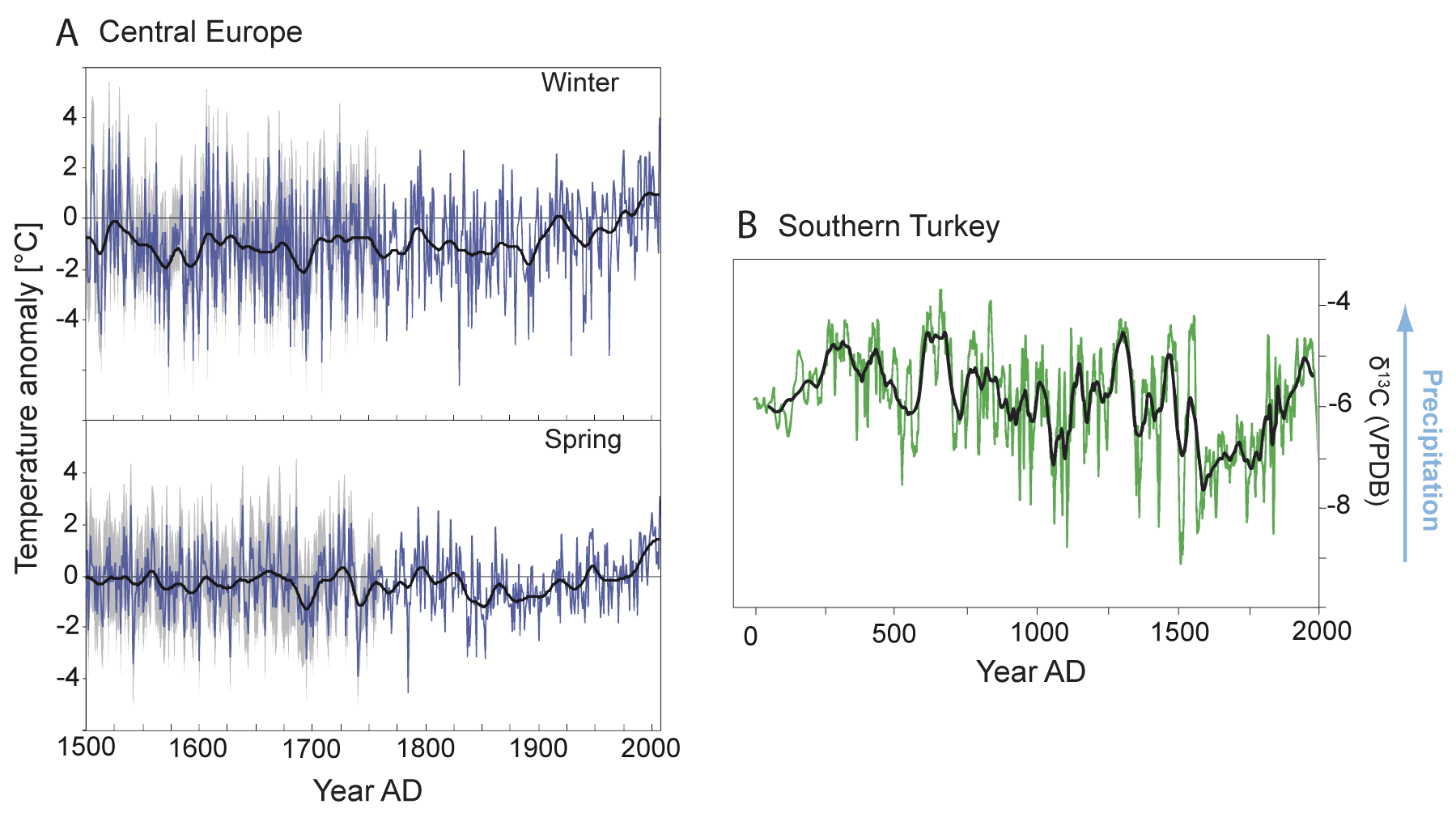- Home
- Publications
- PAGES Magazine
- The First Euro-Med2k Regional Workshop: Review of Current Knowledge, Available Data and Plans For Multproxy Integration
The first Euro-Med2k regional workshop: Review of current knowledge, available data and plans for multproxy integration
Jürg Luterbacher, D. McCarroll, D. Fleitmann, F.J. Gonzalez-Rouco, E. Zorita, S. Salcedo and B. Vinther
PAGES news
19(2)
75-76
2011
Jürg Luterbacher1, D. McCarroll2, D. Fleitmann3, F.J. Gonzalez-Rouco4, E. Zorita5, S. Salcedo6 and B. Vinther7
1Department of Geography, Justus Liebig University of Giessen, Germany; juerg.luterbacher geogr.uni-giessen.de
geogr.uni-giessen.de
2School of the Environment and Society, Swansea University, Wales, UK
3Oeschger Centre for Climate Change Research and Institute of Geological Sciences, University of Bern, Switzerland
4Department of Astrophysics and Atmospheric Sciences, Complutense University-IGEO, Madrid, Spain
5Helmholtz Centre for Materials and Coastal Research, Germany
6Superior Polytechnic School, University of Alcalá, Madrid, Spain
7Centre for Ice and Climate, Niels Bohr Institute, University of Copenhagen, Denmark
Alcalá de Henares, Spain, 22-24 November 2010
Focus 2 (Regional Climate Dynamics) of PAGES places a strong emphasis on regional climate studies that consider past climate dynamics on seasonal to millennial timescales and (sub-) continental or ocean-basin spatial scales (PAGES, 2009). The first Europe/Mediterranean 2k (Euro-Med2k) regional meeting was held in Alcalá de Henares, close to Madrid, and brought together specialists working in different fields related to proxy data, statistical climate reconstructions and data modeling comparison. Discussions focused firstly on current knowledge and availability of documentary sources as well as on seasonally to multidecadally resolved terrestrial and marine archives (Fig. 1) covering the past 2000 years (2 ka) in the European-Mediterranean region.
The participants discussed proxy records with emphasis on their climatic interpretation and the suitability for their integration into the regional reconstruction. Particular issues that were addressed included the handling of differently resolved proxies, target variables, seasonality, preservation of low- and high-frequency variability, replication, “expert knowledge” and calibration/verification. An extended discussion took place on how proxy data should be most effectively collected. It was agreed that the community should collect only published data (using both raw and quantified analyses) from each of the different archives, with a full estimate of the uncertainties included. Importantly, objective criteria for the final selection of records must be developed prior to the generation of final statistically based reconstructions (in consultation with other regional 2k groups; criteria having been presented by two representatives of the Arctic2k group). Qualitative data will also be utilized to cross-check against the climate variability reconstructed from higher resolution records. As a starting point, the group was encouraged to develop a Euro-Med2k metadatabase on the project’s website, to develop an inventory of the records that are currently available and/or being actively developed in the Euro-Med region. Discussions also focused on different statistical methods used in paleoclimatology that can integrate multiproxy data.
A better understanding of the strengths and weaknesses of established and new reconstruction methods and the behavior of different climate proxies was considered essential to reduce uncertainties and biases. A variety of available methods were presented including Bayesian hierarchical modeling and Neural Networks using pseudo-proxy data. These methods provide an estimate of the full covariance structure of the temperature and hydrological reconstructions, but need to be tested first using real proxy data from the Europe-Mediterranean region. A presentation provided new millennial-length coupled climate model results and ways to compare continental-scale multiproxy climate reconstructions with coupled paleoclimate model output.
The group agreed to write a peer reviewed paper including a comprehensive assessment of proxy data availability from the European-Mediterranean area, and a critical evaluation of their strengths, weaknesses, challenges and opportunities for climate reconstructions. To involve the wider community in sharing data and participating in the initiative, specialists on different archives will be approached. First results and a promotion of the initiative will be presented in the PAGES 2k session at the INQUA Congress in Bern in late July 2011. In parallel, data collected and published by the EU project MILLENNIUM (www.millenniumproject.net) and the ESF project MedClivar (http://www.medclivar.eu/) will be used to test different statistical methods. Preliminary reconstruction results from the European-Mediterranean area will feed a joint “2k Consortium” publication, (anticipated submission in late 2011). These results might contribute to the “regional assessment” of IPCC AR5. At a later stage, other initiatives of the group will include a data-model comparison paper using the new statistics-based reconstructions from Europe-Mediterranean covering the past 2 ka with new paleoclimate runs that will become available. The second Euro-Med2k workshop will be held in early 2012.
references
Göktürk, O.M., Fleitmann, D., Badertscher, S., Cheng, H., Edwards, R.L. and Tüysüz, O. 2011: A late-Holocene record of paleoclimate from the Kocain cave in southern Turkey, submitted

